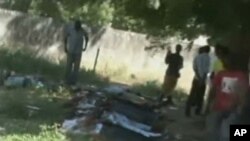Nigerian security forces are searching for attackers who killed more than 100 people in a series of bombings and shootings across northern states this past week.
The coordinated attacks on police stations, churches, and an army base in small towns across northern Nigeria are being blamed on the Islamic sect Boko Haram. The sect claimed responsibility for the August bombing of the U.N. headquarters in the capital Abuja.
Boko Haram, whose name means “Western education is forbidden,” says it is fighting for a separate Sharia-led nation in northern Nigeria and recognizes neither the federal constitution nor the authority of Nigerian President Goodluck Jonathan.
Earlier this year, President Jonathan appointed a committee to look into the violence. That committee recommended opening talks with Boko Haram, but only after it renounces all forms of violence and surrenders its arms. Boko Haram has refused previous negotiation offers because of what it says is a military build-up in northern states.
Nigerian human rights activist Shehu Sani has written extensively on Boko Haram and has interviewed many of its top leaders. He says the government's use of force against the group unites its disparate elements.
“At the beginning, there was some form of ideological difference within the members of the group," said Sani. "But later I think they were able to cement their differences on the ground that they knew that their future and their fate is tied together.”
Sani says the government must now understand that approaching Boko Haram exclusively as a security threat will not end the violence.
“The continuous bombing and killing that is going on is a clear indication of the failure of the use of force,” said Sani.
Sani says the government should address the broader social factors that contribute to Boko Haram's appeal. Among them are high unemployment and the belief that security forces operate with impunity, especially concerning the death of Boko Haram's leader in police custody in 2009.
“The violence is most likely going to continue in the sense that the government is too favorable to the idea of the use of force," added Sani. "And this has been the case since 2009. And it has not produced anything other than the continued loss of lives.”
The Obama administration says it is helping President Jonathan's government track Boko Haram financing through a program established after the September 11, 2001 terrorist attacks. The U.S. Treasury Department says that tracking program is aiding investigations into the October 2010 Independence Day bombings in the Nigerian capital.
Nigerian Security Hunts Attackers Who Killed More Than 100




